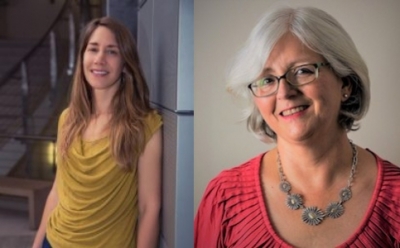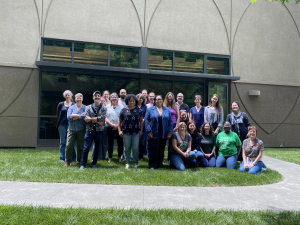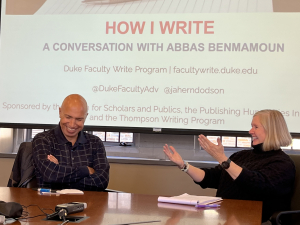"How I Write": A Conversation with Engaged Scholars Emily Janke and Rebecca Dumlao

On November 9, 2018, Jennifer Ahern-Dodson spoke with Engaged Scholars Emily Janke and Rebecca Dumlao about their writing lives. Emily Janke is Associate Professor of the Peace and Conflict Studies department and Director of the Institute for Community and Economic Engagement at UNC Greensboro. Rebecca Dumlao is Professor in the School of Communication at East Carolina University. Together, Janke and Dumlao shared their experience as collaborators, researchers, and writers with the participants at the fall Engaged Scholars Retreat. Here's an excerpt from their conversation.
Ahern-Dodson: Tell us what you do, but particularly one thing that gives you joy.
Dumlao: I love writing at multiple levels. I love fiction writing and non-fiction writing. My mom was an English teacher. I learned to write the old fashioned way, by hand. I remember in high school taking my writing to my mom. We would get out the scissors and the tape and reorganize that way. And I still sometimes do that if I get stuck. Somehow that’s a learned process that is comfortable to me. I have shown this technique to my daughter with some success. The idea of getting a flow in writing and finding words that are almost musical or have a particular feel—that’s what’s exciting for me. I also write outside of academia. I keep a journal. When something comes to me and the words have a musical or lyrical or picturesque quality, that’s what gets me really excited. How to translate that sensibility to academic writing has been a challenge for my whole career. So I’ll stop there.
Janke: I identify as a scholar-administrator. I came ten years ago into service learning, and during that time—immediately after my PhD, when writing was a source of anxiety and stress—I was trying to get my writing out there. There was a lot of anxiety in terms of my identity those first few years. I wasn’t sure where I was going and I also didn’t think I had arrived yet. In 2013, I became a faculty member in Peace and Conflict Studies as well as the Director of the Institute for Community and Economic Engagement (ICEE). So I’m half faculty, half administrator, but it’s never quite equal. What I learned and what brought me joy is bringing those two things together. The things I found I was able to write about didn’t come through traditional research, as I had originally conceived of it, but through my work, such as a service-learning course. I found I wanted to write about that process. I wanted to take that deep dive. Donald Schön’s work has been important to me in realizing that I also learn by doing. The identity of being a scholar-administrator and doing that practice brings me a lot of joy. And having time to do that writing brings me joy, because, for me, anxiety comes from not having that time.
Ahern-Dodson: A thread I heard here was reflection and how that becomes a part of your writing life. So, a follow-up question: do you get stuck in your writing process and what do you do when that happens?
Dumlao: Yes, I have gotten stuck in the not-so-distant past. I had been writing a book on collaborative communication. The first time I got stuck was a moment of self-doubt: who the heck was I to write on this topic? The tension of “Do I really know enough?” was stymieing me. I wondered, am I going to get feedback from other scholars who think this is a piece of crap? Finally, I had an epiphany, if you could call it that. I realized I have taught all these different topics. I have a broad-based background and I have done service learning for several years, so I have all these pieces that fit together, and I said to myself, “Why not me?” In the interim, I kept writing. Sadly, my mother passed away, and I found myself unable to write. I could not really be clear enough to write in the way I wanted. I was frustrated. Eventually, I went to the publisher and told him—heart in hand— “You know, my mother passed away. I can’t write, so I won't’ meet the deadline.” I wondered if I would have to give up the project. I was very fortunate in that the publisher told me to take my time and pick up the writing later. Fast-forward a little further. I’m still writing my book. I’m trying to put parameters around this huge thing, but I begin to wonder—what matters to people who are not communications scholars, and who don’t have my background? I shipped off the first draft of the manuscript to the publisher, and I received an email that I could hardly understand. It said, in short, “This won’t sell.” I’d invested emotionally and cognitively in this project. I’d put myself in this writing. So I wrote back to my publisher and said I’m going to be at the IARSLCE (International Association for Research on Service-Learning & Community Engagement) and asked, “Can I meet with you?” We had a nice breakfast together and what I learned is, he wanted examples. This left me wondering: How am I going to provide examples when I have an assortment of experiences, none of which individually would work? I was basically combining them together and putting fiction writing into non-fiction. I wondered what my colleagues would think of this. So, in short, there were a whole series of blocks while I was writing my book. I was wondering, “Am I willing to put myself out there?” I am happy to say that, as of two weeks ago, the book is out in print. Perseverance is a big takeaway, and being willing to say, “What do I need, personally and professionally, to move forward?” I would talk to my colleagues when I got stuck, and they were very encouraging. Even my dean was very encouraging. So that made a big difference, too. Not to mention family and friends.
Janke: Let me see, what are the times that are most painful? Well, I love sketching out my writing. That’s the easy part. But I write to figure out what I want to say, which is a painful process. I’ve never been able to map out fully what I want to say from the start. I feel I have to go down this path of creating content to figure out what it actually is. Usually when I get stuck, I have written a fair bit but all of the sudden I think everything is pure crap. I get frustrated. There are a few things I do when this happens. First, I print my writing out. I get off the computer and try to reverse diagram my printed out writing. Where was I going and what was I doing? I diagram out the key ideas. Is there something I’m learning that I’ve done, or have I discovered I’ve written a whole new paper? Maybe I discover I’m creating two papers. That’s not a bad thing. I do like trying new strategies, too, so I’ve done the cut-out process that Rebecca mentioned earlier. Second, when I get stuck, I find someone to talk to about it. I need to talk a lot to figure out what I’m trying to say. So finding someone to talk to is very valuable. And finding what they think I’ve said and also what they find interesting is helpful to me. They often make me feel like—through their validation—what I’ve written is worthwhile. Third, I’ll find an article I admire a lot if I get stuck and I’ll re-read it. I’ll look at the writing and try to use some of their sentence starters. If they have really clear pointing language, sometimes that is helpful to me. Or I’ll look at how they organize their writing or how they create a vignette and I’ll try to mimic it. Fourth, finding a collaborator can be a way out. I look for someone I respect who can help me co-write. That’s been somewhat successful, but not always. The last thing is sometimes I just give it time. Maybe the idea isn’t ripe yet. If time is available, sometimes it’s best to put it away and come back to it with fresh eyes, so I don’t have the emotional anxiety. Because those feelings can make you feel already sunk.
Ahern-Dodson: I love that it’s all about motion and keeping things moving, and sometimes that means asking for help to get unstuck. The willingness to ask for help and to share stories about those times when things aren’t going so well as writers can be difficult for engaged scholars and academic writers more broadly. It requires a degree of vulnerability. Thank you for sharing your stories with us. Let’s continue the conversation with questions from our group.
Audience: How do you integrate a consistent writing practice into your daily life?
Dumlao: I’ll be honest, I can be very disorganized with my writing. I get really cool ideas “on the wing.” What I gradually have learned is that if I get these great ideas “on the wing,” and put them somewhere where I won’t lose them, that’s meaningful. What I have gradually moved toward is getting binders to collect whatever ideas I generate. If I only have ten minutes, I might be able to find which of those ideas is most important. Next, I try to find blocks of time and then I get fairly protective of those blocks. I try to get rid of distractions. When I still had kids at home, I would block out times and make sure my kids had an activity or were out of my hair for a period of time so I could focus. This goes back to the idea of finding a flow. Music is very important to me. If I’m really stuck, I’ll put on some strong music that has a real beat to it, and I move myself around the room. Maybe I punch the air as I go. And then put on some calm and soothing music. Sometimes just doing that will push me forward so I can get some writing done. So I’ve learned what music helps me focus and gets me into the flow, so to speak.
Janke: I used to just work nights and weekends like a grad student and then I had a kid. Once he arrived, I’d work during his naptimes. But soon enough, naptimes go away and suddenly you’re parenting. It was critical that I talk to a faculty member early on for guidance. One of my mentors said to me that she tries to get most of her writing done in the summer and produce as much content as possible so that in the school year, she was just revising and resubmitting. I’m pretty protective of my Mays. That’s a quiet period for me. June, too, is an intensive writing period. I did four articles last May, which is unusual for me. But I was so certain it needed to be done by June. I didn’t go to conferences, etc. at all during these months. I was very protective of that time. That’s been the most helpful tip, for me. Also, I block out one day of the week, as much as possible. So I schedule Fridays for writing or research projects. Last year it was Thursdays. I have tried waking up early, but it doesn’t work for me. Some people swear by it, but for me, it just makes me feel rotten. I’ve also tried one hour a day—but that also doesn’t work for me. I need a larger chunk of time. So I pick a day. The other helpful piece of advice is to try to get a deadline. If there is a submission deadline, it keeps a little fire in the belly to get the writing done.
Audience: I want to ask about collaborative writing. What has been successful for you in chunking up a paper or drafting and revising a collaborative piece of writing? What does that look like?
Dumlao: It depends on who I am working with. I have a quantitative communications scholar I have written with collaboratively on multiple occasions. She likes things done a very particular way. She drafts a part, I draft a part, and we exchange. With Emily, I don’t know that I can easily define how we work together in terms of collaborative writing. We—I don’t know. Maybe she can. We each bring stuff and question each other on content. Sometimes she’ll write a draft and I’ll review it or vice versa. What often happens is that one of us drafts a section of the paper, and then we share. And then we’ll work that out and decide from that portion where we’ll go next. One of the things that is great about our working relationship is that we’ve become pretty good at saying “I don’t have the time right now for this. Do you have time?” and going from there. For us, that’s worked pretty well, not just in terms of papers but also in terms of presentations.
Janke: For me, Google drive and sharing have been invaluable. Often, it’s the dialogue and conversation that becomes critical in collaborative writing. If someone has the energy and the time, they’ll write it up in fifteen minutes after we talk through an idea. Generally I need to collaborate and talk for a while with someone before I go off and write by myself. A proposal we might be able to write together, but a longer piece I need to do by myself before bringing it back to my collaborator for feedback. A shared drive is important, though. A clearly delineated sense of who has time and excitement for what is critical. Also clarifying who is the lead author on a work is important to establish early on, and then letting the lead set the tone and tempo.
Ahern-Dodson: Strategies I’m hearing you say have been helpful for collaborative projects are: when you’re handing it off or when you want someone else to take it up, letting them know, “This is where I am, and this is where I’m stuck” That’s a way to get feedback and to direct that feedback in a helpful way. Remember, if the writing is not moving, it’s not working. Checking in with people to gauge their interest in a project is critical.
Janke: There’s a sense of equality and equity. Initially, I thought we’d all do the same amount of work, but that doesn’t have to be true. In fact, there are many instances where that is absolutely not true. When people go silent, it’s important to figure out if that it because they are busy or don’t care anymore. Communication is key in those moments, especially.
Dumlao: I’ve had a couple of times where I’ve had to say “I can’t work this way.” I’m going to say “sayonara” to this particular project. I’ve also had projects where I did a heck of a lot of work and someone else co-opted it. I had a senior colleague do that to me early in my career. I’ve had a few times where I had to make a decision: Do I go in the direction this editor wants me to go, which doesn’t feel like my work anymore, or not. How much does this particular body of work matter to me? In one instance, it resulted in a publication and that was more important at that point in my career than it feeling “like me.”



